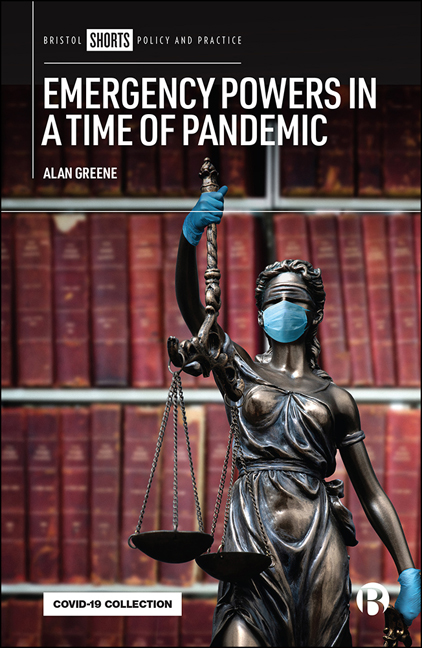Book contents
- Frontmatter
- Contents
- Notes on the Author
- Acknowledgements
- Introduction
- One The Pandemic State of Emergency
- Two Pandemics and Human Rights: Non-Derogable Rights
- Three Pandemics and Human Rights: Derogable Rights
- Four Pandemics and Democracy
- Five The End of the Pandemic Emergency
- Six Conclusions: Breathing Space
- Index
Six - Conclusions: Breathing Space
Published online by Cambridge University Press: 12 March 2021
- Frontmatter
- Contents
- Notes on the Author
- Acknowledgements
- Introduction
- One The Pandemic State of Emergency
- Two Pandemics and Human Rights: Non-Derogable Rights
- Three Pandemics and Human Rights: Derogable Rights
- Four Pandemics and Democracy
- Five The End of the Pandemic Emergency
- Six Conclusions: Breathing Space
- Index
Summary
Introduction
Ideally, all states of emergency are temporary. Ideally, all states of emergency are designed to restore the status quo ante. And ideally, all emergency powers are unpalatable; as it is precisely their unpalatable nature that ensures they remain temporary. It is when these changes become acceptable – even desirable by the majority of the public – that they have the greatest potential to become permanent.
To recall from Chapter Five (The End of the Pandemic Emergency), in the context of the COVID-19 pandemic, it may seem difficult to see how some of these powers could become permanent, owing to the deeply impactful ways in which they have affected everybody's lives. However, this risk of permanent emergency powers is certainly not absent; rather, it may occur in subtly different ways.
In this chapter, I commence by looking at the phenomena that trigger emergency powers, and argue that the risk of pandemic powers becoming permanent stems not from the possibility of the virus itself being a permanent threat, but from the application of these powers beyond pandemics – a risk I highlighted in Chapter Three (Pandemics and Human Rights: Derogable Rights) and Chapter Five. This risk is compounded when emergency powers are deployed through more ‘banal’ means, such as legislation.
Following this, I discuss how some so-called emergency threats do not result in defensive measures designed to restore the status quo ante; rather, they are designed to permanently change the status quo, as this was what caused the emergency in the first instance. I then apply this framework to the postpandemic state, with a view to assessing what permanent, irrevocable changes could – and should – be on the cards. This discussion, in turn, should shape our understanding of what is perceived to be the greatest emergency threat of our time: climate change.
Finally, this chapter concludes by arguing that many of the problems seen as a result of the COVID-19 pandemic arose as the result of poor emergency preparedness. This poor preparedness failed to take into account many of the unique issues facing disparate demographic groups: for example, women, children, older people and certain ethnicities.
- Type
- Chapter
- Information
- Emergency Powers in a Time of Pandemic , pp. 145 - 166Publisher: Bristol University PressPrint publication year: 2020



